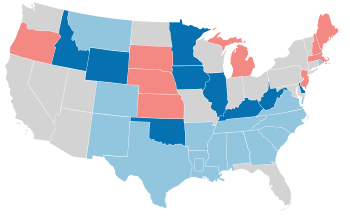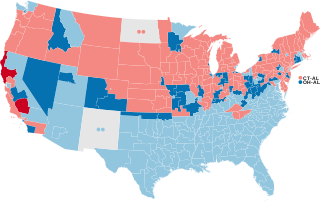| ← 1946 1947 1948 1949 1950 → Presidential election year | |
| Election day | November 2 |
|---|---|
| Incumbent president | Harry S. Truman (Democratic) |
| Next Congress | 81st |
| Presidential election | |
| Partisan control | Democratic hold |
| Popular vote margin | Democratic +4.5% |
| Electoral vote | |
| Harry S. Truman (D) | 303 |
| Thomas E. Dewey (R) | 189 |
| Strom Thurmond (SRD) | 39 |
 | |
| 1948 presidential election results. Red denotes states won by Dewey, blue denotes states won by Truman, and orange denotes states won by Thurmond. Numbers indicate the electoral votes won by each candidate. | |
| Senate elections | |
| Overall control | Democratic gain |
| Seats contested | 33 of 96 seats (32 Class 2 seats + 2 special elections)[1] |
| Net seat change | Democratic +9 |
 | |
| 1948 Senate results
Democratic gain Democratic hold | |
| House elections | |
| Overall control | Democratic gain |
| Seats contested | All 435 voting members |
| Popular vote margin | Democratic +7.2% |
| Net seat change | Democratic +75 |
 | |
| 1948 House election results
Democratic gain Democratic hold | |
| Gubernatorial elections | |
| Seats contested | 33 |
| Net seat change | Democratic +6 |
 | |
| 1948 gubernatorial election results
Democratic gain Democratic hold | |
The 1948 United States elections were held on November 2, 1948. The election took place during the beginning stages of the Cold War. Democratic incumbent President Harry S. Truman was elected to a full term in an upset, defeating Republican nominee New York Governor Thomas E. Dewey and two erstwhile Democrats. The Democrats won back control of Congress from the Republicans. Until 2020, Democrats would never again flip a chamber of Congress in a presidential election cycle. This is the last time that the Democrats flipped the House in a presidential year, and the last time they did so in both houses.
In the presidential election, President Truman ran for reelection despite being widely seen, even by fellow Democrats, as a vulnerable incumbent who was too risky for the party to nominate, but he ultimately won his party's nomination. In the fight for the Republican nomination, Thomas E. Dewey, who lost the previous presidential election, was renominated. In the end, Truman won the presidential election over Dewey in an upset.
In the congressional elections, the Democratic Party benefited from the coattails of Truman's victory and retook Congress. In the Senate, the Democrats took nine seats from the Republicans, regaining control of the chamber. In the House of Representatives, the Democrats won the national popular vote by a margin of 7.2 percentage points, flipped 75 seats from the Republicans, and won a sizable majority in the chamber; a large swing in the House of Representatives would not occur again until 2010.
In the gubernatorial elections, Democrats won six seats from the Republicans and won a majority of gubernatorial offices, Puerto Rico also elected Luis Muñoz Marín of the Popular Democratic Party as its first democratically elected governor.
- ^ One Class 2 Senate seat held both a regularly-scheduled election and a special election in 1948. This seat is not double-counted for the number of total seats.